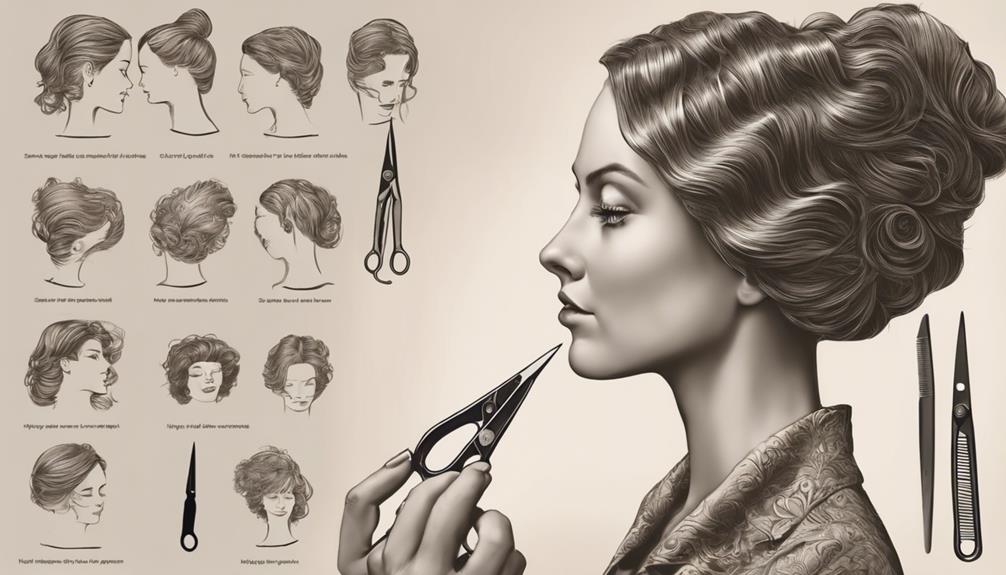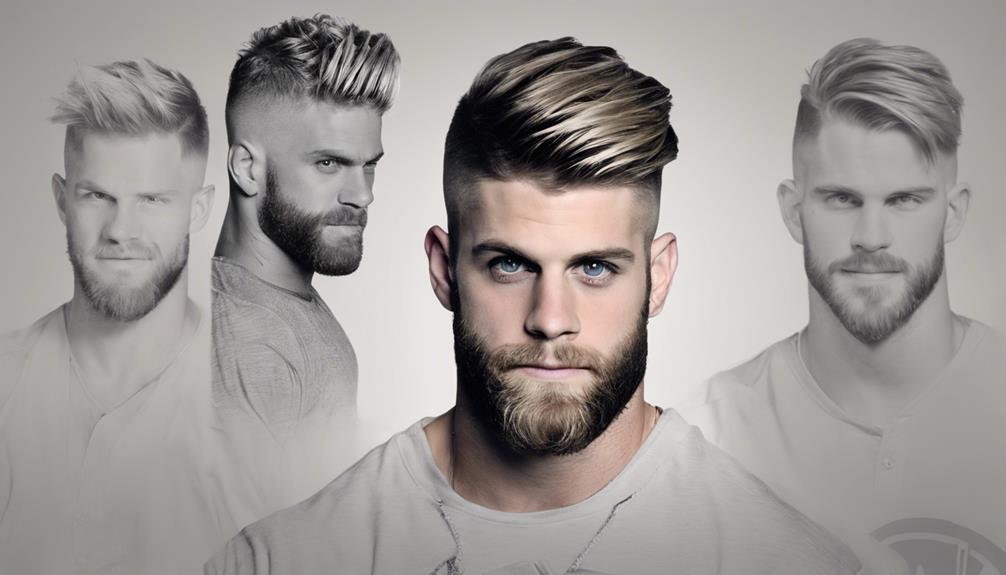Understanding the profound importance of how a woman chooses to style her hair according to religious beliefs is crucial. Adhering to particular guidelines regarding hair length can help in steering clear of vanity and maintaining spiritual values. It’s vital to grasp the relationship between women, their hair length, and their religious convictions.
By considering the symbolism and guidelines concerning hair cutting within different faiths, women can navigate these expectations while embracing their convictions. Let's explore how women can honor their religious beliefs through the practice of hair cutting.
Key Takeaways
- Consult religious leaders for guidance on permissible hair cutting practices.
- Research specific teachings and interpretations within your faith community.
- Maintain long hair as a symbol of modesty and femininity.
- Balance personal convictions with respect for religious guidelines on hair length.
- Navigate societal expectations and seek support in upholding religious beliefs.
Religious Beliefs on Womens Hair Length
Long hair for women is often promoted in various religious beliefs as a symbol of modesty and femininity. In many religious traditions, the length of a woman's hair is seen as a way to outwardly display her adherence to the teachings of her faith. The emphasis on women maintaining long hair can stem from the idea that it symbolizes purity, humility, and submission to divine authority. By adhering to guidelines on hair length, women aim to avoid vanity and uphold spiritual values within their communities.
Across different religious denominations, the significance of hair length for women can vary. While some interpretations may allow for modest haircuts, others may strictly enforce the idea of maintaining long hair as a sign of obedience to religious doctrines. Understanding these nuances is vital for women seeking to adhere to the teachings of their faith while also managing personal choices regarding their appearance. Ultimately, the relationship between women, hair length, and religious beliefs is a complex interplay of tradition, interpretation, and personal conviction.
Scriptural Perspectives on Hair Cutting

When considering scriptural perspectives on hair cutting, it's essential to analyze the guidelines provided within religious texts regarding hair length.
Understanding the cultural interpretations of hair and the historical significance of hairstyles can offer insights into the varying views on cutting a woman's hair.
Exploring these points may shed light on the intersection of faith, tradition, and personal grooming practices.
Hair Length Guidelines
Exploring the diverse scriptural perspectives on hair cutting in various religious beliefs provides insights into the significance of hair length guidelines for women. In some religious teachings, specific scriptural principles guide women on how to cut their hair appropriately. These guidelines often reflect the values of modesty, humility, and adherence to religious traditions. Understanding the nuances of these scriptural interpretations is essential for women seeking to align their grooming practices with their faith.
Different religious traditions may have varying views on the acceptable length of a woman's hair, with some emphasizing longer hair as a symbol of femininity and virtue, while others may prioritize practicality and simplicity. By balancing personal convictions with religious guidelines, women can make informed decisions regarding their hair length in accordance with their beliefs.
Cultural Interpretations of Hair
Hair cutting practices within various cultures are intricately intertwined with religious beliefs, shaping perceptions and interpretations of hair length guidelines for women. Understanding the significance of hair in different cultures can provide insights into how these beliefs are manifested. Here are some key points to take into account:
- Symbolism of Hair: Hair is often seen as a symbol of power, strength, and identity in many cultures.
- Modesty and Respect: For some religions, long hair is associated with modesty for women and respect for men.
- Spiritual Connections: Hair is believed to have spiritual connections, serving as a link between the physical body and the divine.
- Ceremonial Practices: Cutting or not cutting hair may be part of ceremonial practices or rites of passage.
- Social Status: Hair length can also signify social status or marital status in certain communities.
Historical Significance of Hairstyles
With a deep-rooted historical foundation, the significance of hairstyles in religious contexts transcends mere aesthetic considerations to encompass spiritual and cultural dimensions. In biblical teachings, the concept of long hair is often associated with strength, glory, and identity, reflecting cultural norms and spiritual symbolism.
The act of hair cutting, thus, carries weight beyond physical appearance, delving into expressions of faith and adherence to traditional practices. Understanding the cultural and historical context surrounding hair length norms is vital in deciphering the nuanced interpretations of modesty and inner beauty as outlined in religious texts.
Debates within religious communities regarding the appropriateness of hair cutting stem from these multifaceted beliefs, highlighting the intricate tapestry of traditions and values interwoven with grooming practices.
Cultural Expectations Vs. Religious Teachings

When considering the clash between cultural expectations and religious teachings on women's hair, we must analyze the interplay of Tradition Vs. Scripture, Customary Practices Explained, and Religious Rules on Grooming.
These points highlight the complexity of negotiating between societal norms and religious obligations when it comes to hair length and style choices. Understanding the nuances between these facets is essential for women grappling with the decision to cut their hair in accordance with their religious beliefs.
Tradition Vs. Scripture
In examining the dynamics between cultural expectations and religious teachings regarding women's hair length, it becomes evident that the prioritization of tradition over direct scriptural guidance poses a significant challenge for individuals seeking to navigate these complexities.
When considering the tug of war between tradition and scripture in determining acceptable hair lengths for women, several key points emerge:
- Scriptural interpretations may vary, leading to differing views on appropriate hair length.
- Cultural norms often influence how religious teachings on hair cutting are understood and applied.
- Historical traditions sometimes hold more sway than explicit scriptural commands.
- Women may feel torn between upholding religious principles and conforming to societal expectations.
- Understanding the nuances of tradition versus scripture is essential for women making decisions about their hair length.
Customary Practices Explained
Exploring the intersection of customary practices regarding women's hair length reveals the intricate interplay between cultural expectations and religious teachings. In many cultures, long hair is perceived as a symbol of femininity, beauty, and authority, often shaping societal perceptions of women.
Conversely, various religious teachings emphasize modesty and humility in grooming, influencing women's decisions on hair length. This dynamic presents a delicate balance for women, who must navigate between societal norms and religious guidelines when considering cutting their hair.
Understanding this balance is vital for women seeking to align their grooming practices with their religious convictions. Women may find themselves seeking spiritual guidance and personal conviction to make informed choices about their hair length, ultimately aiming to uphold both cultural traditions and religious values.
Religious Rules on Grooming
Different religious beliefs prescribe distinct guidelines for women's grooming practices, particularly concerning hair length and cutting, reflecting the intricate interplay between cultural expectations and religious teachings.
When contemplating religious rules on grooming for women, it's vital to navigate the delicate balance between adhering to cultural norms and upholding religious principles. Here are some key points to bear in mind:
- Some religious traditions emphasize modesty and simplicity in grooming choices, impacting decisions on cutting their hair.
- Cultural expectations often influence religious teachings on grooming, leading to diverse interpretations and practices.
- The intersection of cultural norms and religious beliefs can pose challenges for women seeking to honor their faith through grooming.
- Understanding the nuances of different religious rules on grooming is essential for women making decisions about their hair.
- Women must navigate the complexities of grooming practices to align with both cultural and religious expectations.
Challenges Faced by Women Abiding by Hair Rules

Managing the societal expectations linked to keeping long hair for religious reasons can present significant challenges for women, affecting their daily lives and self-expression. Women adhering to religious beliefs advocating for long hair may face physical discomfort and inconvenience in maintaining the required hair length.
The pressure to comply with these hair rules can lead to scrutiny and judgment from within their communities, potentially impacting their sense of identity and belonging. Additionally, the generational influence on beauty standards can further complicate how women navigate the decision to cut their hair while upholding religious convictions.
Some women may seek alternative methods or loopholes to follow the rules while managing their hair length, demonstrating a nuanced approach to balancing tradition with personal preferences. These challenges highlight the complex interplay between religious beliefs, societal expectations, and individual autonomy in shaping women's experiences with hair grooming practices.
Individual Interpretations and Convictions

Considering the diverse interpretations of religious beliefs among women, the approach to cutting one's hair can vary greatly based on individual convictions and understandings. When it comes to maneuvering the complexities of religious teachings on hair cutting, personal convictions play a significant role in shaping women's choices.
Here are some key points to ponder:
- Paul's Teachings: Understanding the specific scriptural references, like those from Paul in the New Testament, can influence how women interpret guidelines on hair cutting.
- Cultural Context: The cultural background in which a woman resides can impact her understanding of religious teachings regarding hair cutting practices.
- Personal Convictions: Women often weigh their personal beliefs and values against religious guidelines to determine how they'll approach cutting their hair.
- Community Expectations: Balancing personal convictions with the expectations of one's religious community can be a challenging aspect for women maneuvering hair cutting practices.
- Impact of Diversity: The diverse range of interpretations within religious communities can lead to a spectrum of approaches when it comes to women cutting their hair.
Practical Tips for Women Regarding Hair Cutting

When approaching hair cutting practices in accordance with religious beliefs, it's advisable for women to seek guidance from religious leaders or scholars to guarantee adherence to acceptable practices.
In many religious traditions, women are encouraged to maintain long hair as a symbol of femininity and modesty. However, some beliefs allow for trimming hair for hygiene and maintenance purposes.
To navigate this, women should research specific teachings and interpretations on hair cutting within their faith. Understanding the reasons behind hair cutting restrictions in various religious traditions can provide insight into the significance of maintaining long hair.
It's essential for women to balance their personal convictions with respect for religious guidelines when deciding on hair cutting practices. By seeking knowledge and guidance from knowledgeable sources, women can make sure that their hair cutting practices align with their religious beliefs while also meeting their personal needs for hygiene and maintenance.
Frequently Asked Questions
What Does God Say About a Woman Shaving Her Head?
We believe that when considering a woman shaving her head, interpretations vary based on cultural and religious contexts. The Bible doesn't explicitly address women shaving their heads, but historical perspectives suggest it was associated with shame or mourning.
Individual beliefs and convictions, along with cultural norms, often guide decisions on this matter. It's important to understand the significance within one's specific religious tradition and personal understanding of scriptures to make an informed choice.
What Religion Prevents You From Cutting Your Hair?
Certain religious beliefs, like those of specific Christian denominations, discourage or forbid women from cutting their hair. This practice symbolizes adherence to traditional values and religious principles. The significance of uncut hair for women varies among religious groups, each with unique interpretations.
For us, refraining from cutting hair is a personal commitment to our faith. It reflects our dedication to religious practices and beliefs.
Is It Biblical for a Woman to Cut Her Hair?
We believe that the biblical perspective on a woman cutting her hair isn't explicitly clear-cut. Interpretations vary, influenced by cultural and personal beliefs.
Some view it as acceptable if done modestly and with respect for God's creation. Understanding individual convictions and biblical teachings guides decisions on this matter.
Ultimately, the decision to cut hair should align with personal faith and values.
What Christians Can't Cut Their Hair?
Some Christians who adhere to specific denominational teachings or personal convictions choose not to cut their hair as a sign of spiritual dedication or obedience. This practice is often associated with modesty, holiness, and adherence to religious doctrines.
For these individuals, uncut hair is a symbol of their faith and commitment to their beliefs. The decision to abstain from cutting hair is deeply rooted in personal interpretations of scripture and religious traditions.
What Are the Religious Beliefs Around Women Cutting Their Hair?
In many religious beliefs, the act of women cutting their hair signifies modesty and humility. For example, in some traditions, women may avoid cutting their hair as a way of concealing extensions in a pixie cut, adhering to the belief that long hair is a symbol of femininity and beauty.
Conclusion
To sum up, managing the equilibrium between cultural norms and religious beliefs concerning women's hair length can be a intricate and personal journey.
One example is of a young woman who faced scrutiny from her community for trimming her hair short, but found strength in her faith and conviction to stay true to her religious teachings.
It's crucial for women to seek guidance, reflect on their beliefs, and make decisions that align with their individual interpretations and convictions.










